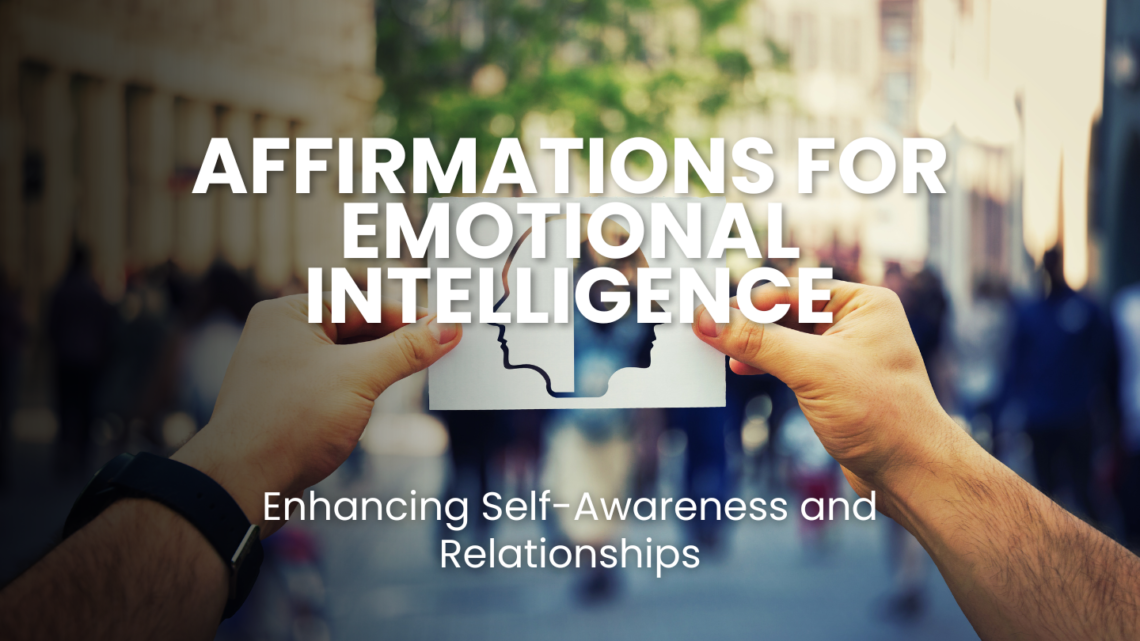Emotional intelligence is the cornerstone of meaningful relationships and personal well-being. It enables you to recognize, understand, and manage your emotions while effectively navigating interpersonal dynamics. Affirmations can be a powerful tool in developing emotional intelligence by encouraging self-awareness, empathy, and emotional regulation. In this blog post, we will explore affirmations that help enhance emotional intelligence, foster self-awareness, and nurture meaningful relationships.

What is Emotional Intelligence?
Emotional intelligence (EI) refers to the ability to identify and manage your own emotions, as well as the emotions of others. People with high emotional intelligence are adept at handling relationships, navigating social complexities, and making emotionally-driven decisions. Emotional intelligence encompasses five core components:
- Self-awareness: Recognizing your emotions and their impact on your thoughts and behavior.
- Self-regulation: Managing your emotions in healthy and constructive ways.
- Motivation: Using emotions to pursue goals with energy and persistence.
- Empathy: Understanding and sharing the feelings of others.
- Social skills: Managing relationships to move people in desired directions.
Developing emotional intelligence can lead to improved communication, deeper relationships, and enhanced mental health. By incorporating affirmations into your daily life, you can build the emotional skills necessary to thrive in both personal and professional settings.
Affirmations to Enhance Emotional Intelligence
Here are affirmations aimed at boosting each of the five key components of emotional intelligence.



1. Affirmations for Self-Awareness
Self-awareness is the foundation of emotional intelligence. It involves understanding your emotions, what triggers them, and how they influence your thoughts and actions. These affirmations encourage introspection and a deeper understanding of yourself:
- I am aware of my emotions and their impact on my actions.
- I acknowledge my emotions without judgment.
- I understand that my feelings are valid and deserve attention.
- I am in tune with my inner thoughts and feelings.
- I take the time to reflect on my emotions and learn from them.
- I am conscious of how my emotions influence my decisions.
- I understand my strengths and weaknesses and accept them fully.
- I am mindful of my emotional responses and take responsibility for them.
- I embrace self-reflection as a way to grow emotionally.
- I am open to learning from my emotional experiences.
2. Affirmations for Self-Regulation
Emotional regulation is the ability to manage your emotions constructively. It enables you to respond to situations calmly and thoughtfully rather than react impulsively. These affirmations promote emotional control and resilience:
- I manage my emotions with grace and composure.
- I am in control of how I respond to my emotions.
- I choose to respond calmly in challenging situations.
- I am patient and forgiving with myself when I feel overwhelmed.
- I release emotions that no longer serve me in a healthy way.
- I find healthy outlets to process and express my emotions.
- I remain grounded, even in moments of emotional turbulence.
- I can shift my mindset to one of positivity and calm.
- I choose to let go of anger and replace it with understanding.
- I am the master of my emotions, not the other way around.
3. Affirmations for Motivation
Emotional intelligence also involves being motivated to achieve goals and using emotions to fuel that motivation. These affirmations will help you channel your emotions into positive actions and stay driven:
- I am motivated to achieve my goals with passion and perseverance.
- I use my emotions as a source of inspiration and drive.
- I stay focused on what truly matters to me.
- I am capable of overcoming any emotional hurdle to reach my goals.
- I trust that my dedication and hard work will lead to success.
- I maintain a positive mindset and stay committed to my personal growth.
- I transform challenges into opportunities for emotional growth.
- I am resilient in the face of setbacks and keep pushing forward.
- I use my emotions as fuel to stay determined and focused.
- I am driven by my passion and motivated by my inner strength.
4. Affirmations for Empathy
Empathy is the ability to understand and connect with the emotions of others. It is a key element of emotional intelligence that allows you to build meaningful relationships and show compassion. These affirmations foster greater empathy and emotional connection with others:
- I am empathetic and understanding toward others.
- I listen deeply and compassionately to the emotions of those around me.
- I am attuned to the feelings and needs of others.
- I can step into others’ shoes and see things from their perspective.
- I offer kindness and support to those in need.
- I am patient and understanding in my relationships.
- I validate the emotions of others and respond with care.
- I recognize that everyone is doing their best, including myself.
- I am open to learning from the emotional experiences of others.
- I build stronger connections by practicing empathy and compassion.
5. Affirmations for Social Skills
Strong social skills are crucial for building relationships, resolving conflicts, and working well with others. These affirmations will help you enhance your communication abilities and create harmonious connections:
- I communicate clearly and confidently in all social interactions.
- I am skilled at resolving conflicts with understanding and respect.
- I create positive and supportive relationships with ease.
- I express my thoughts and feelings in a way that fosters understanding.
- I am comfortable and confident in social situations.
- I trust my ability to build meaningful connections with others.
- I am a good listener and value the perspectives of others.
- I use emotional intelligence to navigate complex social situations.
- I create harmony and connection in all my relationships.
- I am capable of leading with empathy and understanding.



How Affirmations Can Improve Emotional Intelligence
Affirmations are positive statements that help shift your mindset and rewire negative thinking patterns. When repeated regularly, affirmations can create a positive mental environment that supports emotional growth. Here’s how affirmations can improve emotional intelligence:
1. Reinforcing Positive Emotional Habits
By repeating affirmations that focus on self-awareness, emotional regulation, empathy, and social skills, you can gradually internalize these traits and make them a natural part of your behavior.
2. Encouraging Mindful Responses
Affirmations help you become more aware of your emotional triggers and give you the space to choose mindful responses. For example, an affirmation like “I choose to respond calmly in challenging situations” helps you practice emotional control when you’re faced with stress or frustration.
3. Enhancing Empathy and Compassion
Affirmations centered around empathy can foster deeper emotional connections with others. By regularly affirming your desire to understand and connect with the emotions of others, you increase your capacity for compassion.
4. Building Emotional Resilience
Affirmations can help you cultivate emotional resilience by encouraging you to view challenges as opportunities for growth. Regularly affirming your ability to handle adversity strengthens your emotional coping skills.
Practical Tips for Using Affirmations to Develop Emotional Intelligence
To maximize the effectiveness of affirmations, it’s important to integrate them into your daily routine with intention. Here are some practical tips for using affirmations to develop emotional intelligence:
1. Repeat Affirmations Consistently
Consistency is key when it comes to affirmations. Set aside time each day to repeat your affirmations, either in the morning, before bed, or during moments of reflection. You can also write them down in a journal.
2. Visualize Positive Outcomes
As you repeat your affirmations, visualize yourself successfully embodying the traits you want to cultivate. For example, if you’re working on empathy, imagine yourself engaging in a compassionate conversation with a loved one.
3. Pair Affirmations with Mindfulness
Incorporating mindfulness practices, such as meditation or deep breathing, alongside your affirmations can enhance their effectiveness. This will help you stay grounded and focused on your emotional growth.
4. Tailor Affirmations to Your Needs
Personalize your affirmations to address the specific areas of emotional intelligence you want to improve. If you struggle with self-regulation, focus on affirmations related to managing emotions. If you want to strengthen relationships, prioritize empathy-focused affirmations.
5. Practice Affirmations in Real-Time
When faced with emotionally challenging situations, use your affirmations in real-time to remind yourself of the positive emotional habits you’re cultivating. This can help you stay calm, collected, and emotionally intelligent during difficult moments.
Conclusion
Affirmations are a powerful tool for developing emotional intelligence, enhancing self-awareness, and building meaningful relationships. By incorporating these affirmations into your daily life, you can strengthen your emotional skills, improve communication, and cultivate deeper connections with others. Whether you’re working on managing your emotions, improving empathy, or navigating social situations with ease, these affirmations can serve as a valuable resource on your journey toward emotional intelligence.








